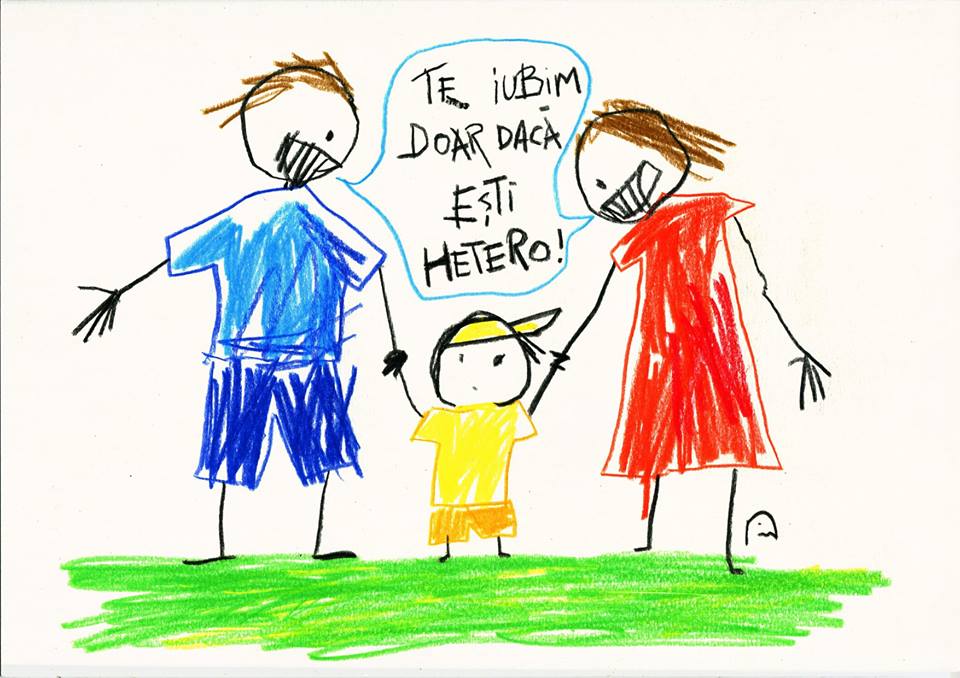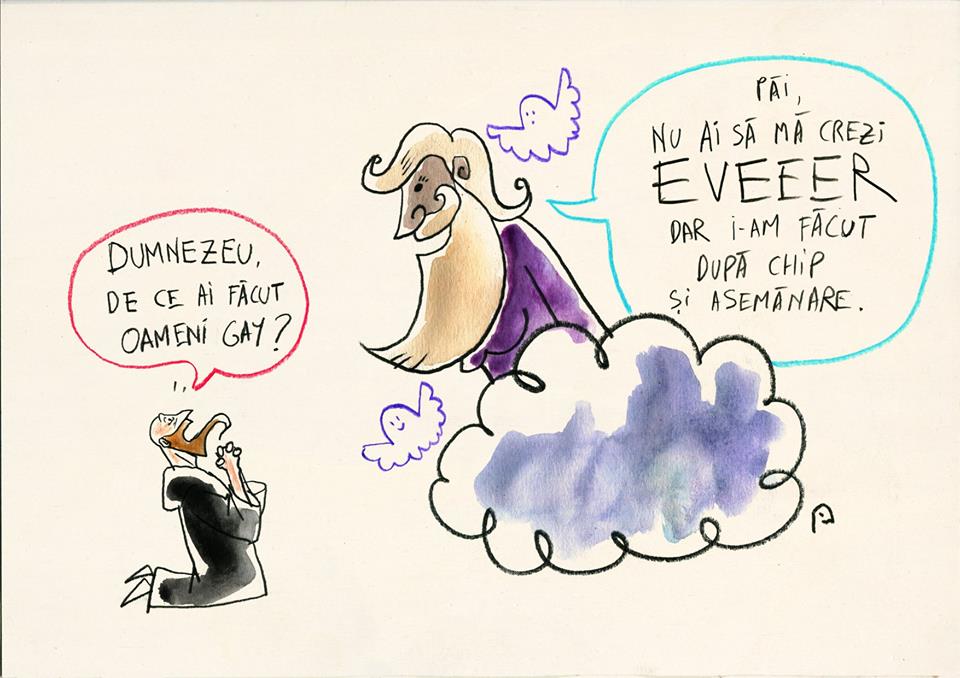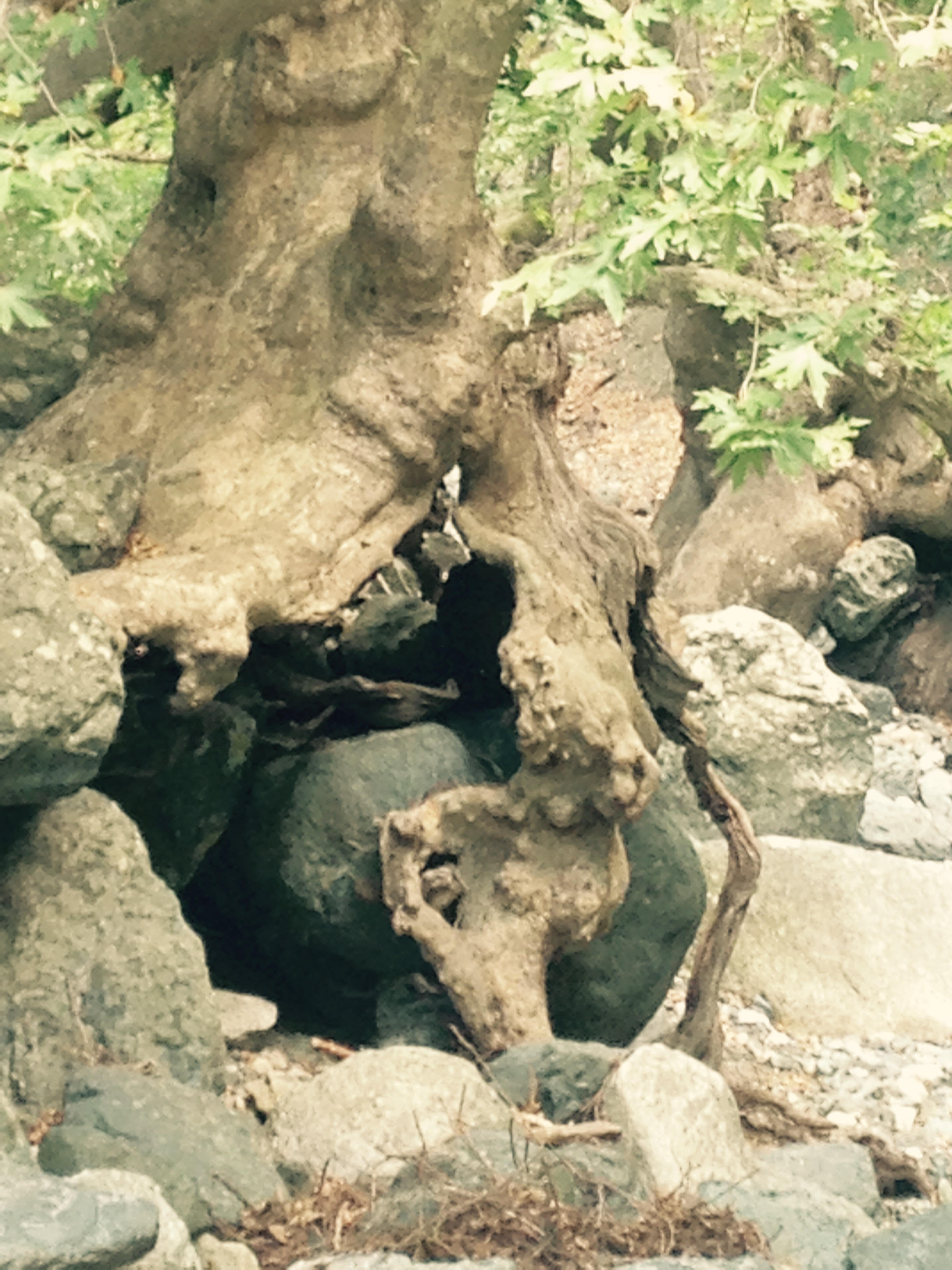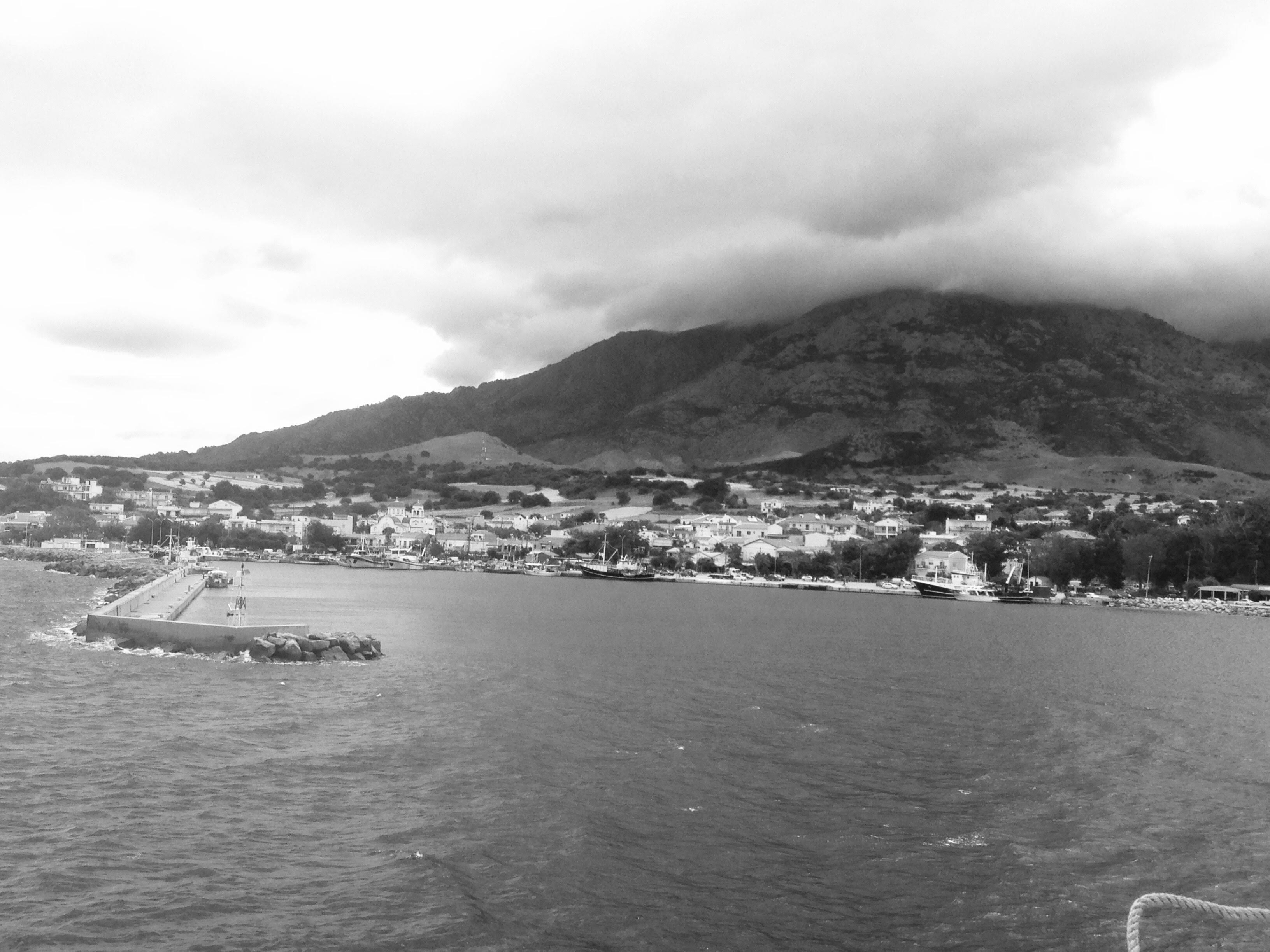– Mâine-poimâine îmi faci și mie un boboc din ăsta! exclamă bărbatul și-i trage o palmă peste fund femeii care merge pe lângă el. Doamne ajută! continuă și-și face o cruce mare. Ea bălmăjește ceva neinteligibil, vizibil jenată de comportamentul specimenului care o însoțește. Dar merge în continuare alături de el, cu capul plecat, vorbind în șoaptă și aranjându-și o șuviță de păr.
Aceasta este una din ultimele amintiri din timpul plimbărilor mele prin București cu piticul în sistemul de purtare, înainte de plecare. Cei doi au trecut pe lângă mine și asta a fost reacția lui când mi-a văzut bebelușul, într-o după amiază pe cheiul Dâmboviței. El neglijent și zgomotos, ea foarte aranjată și tăcută.

Acum câțiva ani buni am văzut filmul “If These Walls Could Talk 2”, un film american cu poveștile unor cupluri de femei din SUA din timpuri diferite. Dincolo de scene apetisante de sex între Ellen DeGeneres și Sharon Stone, care se străduiau să aibă un copil prin inseminare artificială (și au reușit, apropo), sau între Chloe Sevigny și Michelle Williams, este și povestea a două băbuțe care se iubeau. La un moment dat, una dintre ele are un accident și este dusă la spital. Partenera ei așteaptă pe hol toată noaptea și dimineață este anunțată, la întrebările ei insistente, că iubirea vieții ei a murit. Ar fi vrut să fie alături de ea în ultimele clipe de viață, dar nefiind rudă, nu i-a fost permis acest drept. Apoi rudele celei decedate (cu care băbuța ‘ciudată’ nu mai avusese de-a face de ani buni oricum) vin și îi iau partenerei rămase în viață absolut tot: casa și toate obiectele din ea. Căci, ați ghicit deja, ea, după o viață petrecută împreună cu partenera ei, nu avea niciun drept.
Cuplurile de același sex sunt împreună din aceleași motive ca și cuplurile de sexe diferite: se iubesc, vor să construiască o viață împreună, vor să se susțină reciproc, vor să evite singurătatea, vor să crească copii. Se căsătoresc (sau încheie parteneriate civile) din aceleași motive din care o fac și cuplurile hetero: administrativ e util în foarte multe situații – adică din punct de vedere legal, al drepturilor civile. Altfel, hârtia aia semnată nu înseamnă mare lucru în comparație cu investiția emoțională și energetică într-o relație.
Iar când aud despre teama oamenilor de a le acorda cuplurilor de același sex dreptul de a crește copii, mă minunez că nu se simt deloc lezați și nu consideră că este o amenințare la adresa societății felul în care sunt crescuți copiii instituționalizați sau copiii din multe familii de cupluri hetero de care, dacă ești cu toți boii acasă, te îngrozești. Nimeni nu face vreun curs și nu dă vreun examen înainte să fie părinte. Iar în România, din păcate, e încă la ordinea zilei abuzul. Însă dacă ești hetero, hei, e dreptul tău să ai copii. Am lucrat cu copii dintr-un centru de plasament și am certitudinea că nicio familie care i-ar fi iubit, indiferent de componența ei, nu putea să le provoace traume mai mari decât cele pe care le aveau deja. În plus, teama de ‘contaminare’ este nejustificată – copiii gay se nasc în cupluri hetero. N-au cum altfel.

Știți, familia mea nu este una ‘tradițională’. Deși partenerul meu este bărbat – nu firesc și nici întâmplător, ci fiindcă așa am ales. Desigur, ca toți oamenii, avem lucruri de învățat, de îmbunătățit, de schimbat. Lucrăm la asta zilnic. Dar eu nu primesc palme pe stradă sau acasă, niciunul dintre noi nu are probleme cu alcoolul, nu ne vorbim urât, nu suntem agresivi, nu ne mințim și înșelăm, iar când apar disensiuni discutăm de pe picior de egalitate, ca doi oameni cu capul pe umeri, și găsim soluții. Eu nu i-am făcut lui un copil, ci împreună l-am conceput și împreună îl creștem în fiecare zi, chiar dacă natura a decis ca eu, fiind sexul puternic (sâc!), să-i dau naștere – o naștere la care, ca și la concepție, am fost prezenți împreună, făcând fiecare partea lui de muncă.
Dincolo de faptul că acest referendum nu ia nimănui un drept pe care l-ar avea (căsătoria între persoanele de același sex fiind interzisă oricum prin codul civil), el este o cheltuială inutilă, o manevră menită să distragă atenția de la lucruri importante și să învrăjbească în loc să unească. Și e revoltător că se cheltuiesc bani pe asta în condițiile în care e atât de mare nevoie de ei pentru atâtea alte lucruri.
Am încercat să mă gândesc cum ar fi dacă analizăm lucrurile la un nivel mai mic. Într-o familie. Să zicem că statul/ țara e o familie mai mare. Haideți să privim situația ca și când s-ar întâmpla într-o familie la scară mai mică, să vedem cum ar fi. Să zicem deci că suntem o familie cu doi părinți, câțiva frați, verișori, unchi, mătuși, bunici. Și noi cu toții mâncăm carne la fiecare masă (am ales exemplul ăsta pentru că ne e mai ușor tuturor să-l digerăm). Așa a fost dintotdeauna în familia noastră. La un moment dat se naște un copil care refuză carnea. Deși mama și tata mănâncă la fiecare masă carne, mama a mâncat carne toată sarcina și mănâncă în continuare pe tot parcursul alăptării. Îl ducem la doctor și doctorul spune că nu e bolnav. Ne străduim cu toții în ficare zi să-l îndopăm cu carne. Nimic. Vomită. În schimb, mănâncă fericit legume și fructe.
Ce facem? După ce râdem bine de el și-l ridiculizăm de fiecare dată când îl vedem cu un morcov în mână (că doar e ciudatul familiei vegetarianul ăsta mic), îl batem bine ca să-și bage mințile-n cap și facem un consiliu de familie în care discutăm zile în șir închiși în casă și la final votăm în mod democratic dacă la noi în casă pot exista sau nu și feluri de mâncare fără carne doar pentru nemâncătorul de carne. Considerând că noi, toți ceilalți, mâncăm carne la fiecare masă, cădem de acord prin votul majorității că o astfel de cerere ar fi absurdă și ar complica inutil pentru noi activitățile administrativ-gospodărești, pe lângă faptul că vederea legumelor și fructelor la fiecare masă ne scârbește peste măsură și ne lezează simțul corectitudinii și al adevărului. (Nimeni nu poate trăi fără carne, de unde să-ți iei proteinele?!) “Atâta vreme cât stai la mine în casă, vei face cum îți spun eu!” Știți refrenul. La el în cameră minoritarul n-are decât să mănânce ce vrea dacă-și permite să-și cumpere, dar să nu-l vedem noi. În timpul dezbaterilor cu ușile închise, mașina familiei dispare din fața casei și porcul din cocină, iar hoțul care ne-a furat televizorul luna trecută este eliberat din închisoare pe motiv că, nefiind un televizor foarte mare, a fost un delict minor și hoțul nu prezintă un pericol la adresa societății. Noi eram ocupați cu probleme importante.
Revenind așadar. Comunitatea LGBT oricum nu cere ca preafericitul să le pună pirostriile pe cap în cadrul unor ceremonii pompoase oficiate în catedrala mântuirii neamului. Cere doar un drept civil pe care îl are oricine. Drepturile civile nu au nicio legătură cu convingerile și practicile religioase. Deci statul, care ar trebui să apere drepurile civile și să nu propovăduiască obiceiurile și credințele religioase, nu are, logic, vreun sens să interzică un drept civil unei categorii de oameni care, apropo, nu sunt toți creștini! Nu e ironic că din banii publici (adică ai tuturor plătitorilor de taxe, indiferent de orientarea lor sexuală sau religioasă) se finanțează nu doar construcția catedralei mântuirii (care aparent n-are vreo treabă directă cu subiectul de față), ci și acest referendum care nu ajută cu absolut nimic societatea românească? În contextul în care, de pildă, în fiecare zi mor oameni din cauza sistemului de sănătate care e putred, iar infrastructura e la pământ etc etc.
Nu, nu, acesta nu este un articol împotriva referendumului pentru familie, deși sper ca toți oamenii cu mințile-n cap să-l boicoteze prin neprezentare. Acesta este un articol pentru discernământ, drepturi egale și iubire. Oamenii se trezesc. Treptat, încet, dar se trezesc. Iar poporul ăsta, din păcate, nu are o istorie de pace și toleranță la adresa conducătorilor pe care nu i-a mai vrut.
Cât costă referendumul pentru familie? ‘Decât’ 43 de milioane de euro. Să dezbini o țară? Neprețuit.
PS Democrația nu înseamnă dictatura majorității. În limba greacă, înseamnă puterea poporului (demos = popor, kratos = putere), iar ca formă de organizare înseamnă participarea tuturor cetățenilor la actul politic. Adică toți sunt reprezentați în luarea deciziilor și toți au drepturi care le sunt respectate. Votul este majoritar, dar minoritățile sunt protejate, iar puterile în stat sunt separate (deci biserica e biserică și justiția e justiție, nu se calcă reciproc pe bătături și nici nu se mângâie reciproc pe cap).
Desene făcute de Mureșan Paul, găsite pe Facebook și publicate cu permisiunea autorului.

